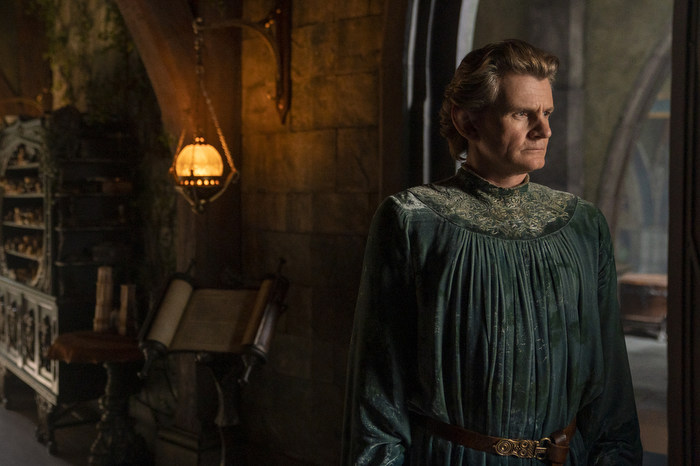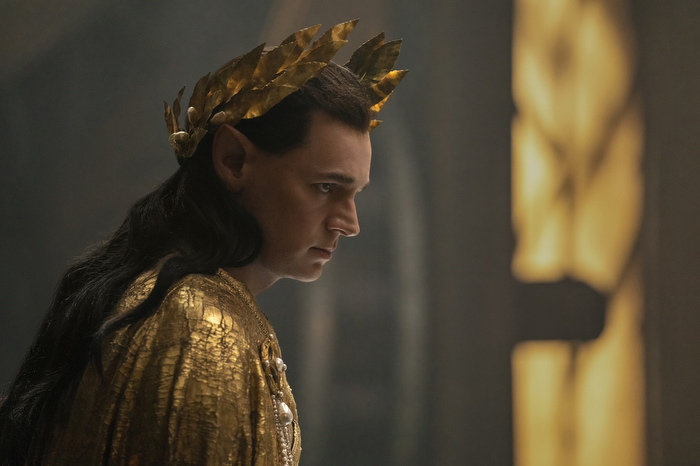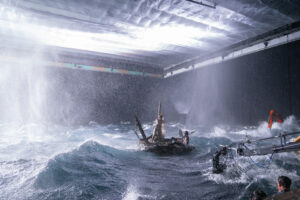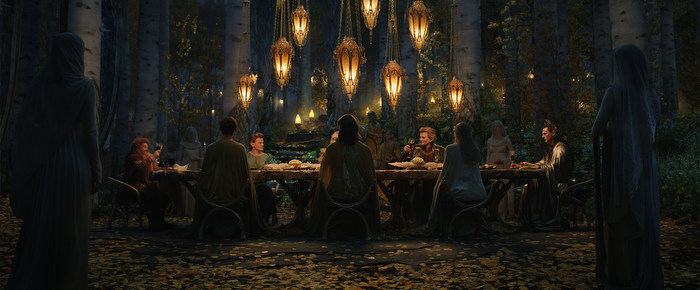How I learned to stop worrying and love the adaptation

There are few things in life that elicit a simultaneous sense of excitement and fear quite like the announcement that one of your favourite books is about to be adapted for the screen. And as the hype begins to gather pace for Amazon’s new Lord of the Rings series “The Rings of Power”, I find myself once again back in that familiar place. Will it be the unbridled joy of seeing Tolkien’s Middle-earth again in all its glory, feeling that wide-eyed wonder of the first sighting of The Shire or the Argonath in The Fellowship of the Ring? Or will it be despair – Radagast riding his bunny-sled around Eriador, or those twirly-wirly arrow-killer things of Dáin’s army? In all likelihood, a little from column A and a little from column B.
Peter Jackson’s first foray into Middle-earth was, let’s face it, astonishing. The movies looked incredible (and still do!) and they were utterly compelling. Sure, there were some huge changes to the book story, but it didn’t seem to matter much – they were just such great films, you could overlook the differences. Well, most of us could. Yet I found watching Jackson’s Hobbit movies a decade later to be an extremely painful experience. Changes to the lore (lore crimes?) that hadn’t bugged me in the first trilogy drove me nuts in The Hobbit. Why was that? I’m not sure that these later films stray any further from the books than the original trilogy did. In fact I seem to recall Corey Olsen (The Tolkien Professor) contending that they were actually more faithful book adaptations than the first trilogy was. It took me a while to realise that the difference was not how true the films remained to the book, but how well Jackson told his story. And sadly the storytelling of Jackson’s Hobbit was simply all over the place, a fractured mess at times that reflected the uncertainty of the production (until fairly late in the day it was just going to be two movies). This still feels like a real shame, as they were so full of potential (Martin Freeman’s Bilbo, for example, is superb). Ten years on and I still get PTSD every time I see a giant statue of a golden dwarf melting.
Undoubtedly the safest way to watch an adaptation is to watch it before you’ve read the book. One of my favourite authors is Bernard Cornwell, one of THE great writers of historical fiction, and author of the best-selling Sharpe series. I had read much of Cornwell’s other work, and catching the first episode of the Sharpe TV series I was instantly hooked. Sean Bean plays Richard Sharpe, a soldier in Wellington’s army during the Napoleonic wars, and a character so tough that he even survives being played by Sean Bean. Sharpe was instantly identifiable as an archetypal Bernard Cornwell hero – the series felt like a Cornwell story. I loved it. Of course, when I finally got to the books, I could spot all sorts of changes made for the shows – not least the fact that the blond-haired Yorkshireman version of Sharpe portrayed by Sean Bean was categorically not the dark-haired cockney Sharpe of the books. This is exactly the sort of thing that tends to enrage obsessive book fans, but Bean’s portrayal of Richard Sharpe was so utterly brilliant that Cornwell actually retconned Sharpe’s story to incorporate Bean’s version into the books, giving the character a youth spent in Yorkshire to account for the accent! Cornwell has even gone as far as to say that when he writes Sharpe now, it is Sean Bean’s voice that he hears in his head. I wonder what changes the expert retconner, Tolkien himself, might have made in his books following the Jackson films? Perhaps after one too many ales he would have made the Kili/Tauriel relationship canon.

Bernard Cornwell is no stranger to adaptations, and when his popular Last Kingdom books were made into a Netflix series recently, there were a raft of major changes to the story. The books follow the life of Uhtred, a Saxon raised by Danes who ends up leading the armies of Alfred the Great against the Vikings. Uhtred’s story is told over a period of eighty years, and while the show begins by following the books fairly closely, as events unfold they stray further and further from the book narrative. This is complicated by the fact that Cornwell’s story is set against the background of the real story of Alfred the Great and his descendants as the country of England takes shape. Following the books to the letter would mean using perhaps a few different Uhtreds and an ever-changing cast of characters. The producers understandably want to stick with a familiar cast that the audience know, and the only way to do this is… big changes. Time compression. By the end of seasons four and five, very little of the books remained. But I still thoroughly enjoyed the show. They told a good story. Despite the changes, it still felt like Bernard Cornwell. And the same applies to Alexander Dreymon’s portrayal of the hero Uhtred – the 5’ 9” dark haired and beardless Dreymon is very different to Cornwell’s Uhtred, a massive man whose book description brings to mind Chris Hemsworth’s Thor – but Dreymon absolutely nails Uhtred’s attitude, which is far more important than any physical resemblance. Cornwell himself is very fair when it comes to adaptations of his work – “I stand back and let them do what they do best! Making television or films is hard work, very hard work. It’s dependent on the contribution of scores of clever people… The last thing film crews need is an author whining that they have corrupted his or her vision… The folks who produce television (and movie) dramas are inventive, imaginative and brilliant, so be grateful for their creative input. It adds richnessi .”
One show that is perhaps oddly relevant to The Rings of Power is Black Sails. It is not an adaptation as such, rather an invented prequel to the famous and much-loved Robert Louis-Stevenson book Treasure Island. Sound familiar? We get characters that we know – most notably Long John Silver, Billy Bones and Captain Flint, as well as a host of fictionalised real-life pirates including Anne Bonny, Jack Rackham and Blackbeard. It’s a fantastic show, four seasons of swashbuckling brilliance full of intrigue, wonderful costumes and some brilliant seafaring scenes – as well as a rather good soundtrack composed by one Bear McCreary, who is reportedly teaming up with Howard Shore for the Rings of Power score. Toby Stephens’ Captain Flint is a tour-de-force, and the character only gets better when it becomes clear that he is gay. One can imagine the reaction from the woke-police orcs of the Tolkien fandom if the same thing happened in The Rings of Power to, say, the character of Círdan, but in Black Sails it gives Captain Flint’s character an added depth which lifts the whole show up another level, as well as a much-needed departure from the traditional macho pirate trope. The show is not ruined by playing fast and loose with existing history or canon – rather, it is successful because the story-telling is absolutely first rate.
Alongside Tolkien and Cornwell, my holy trinity of favourite authors is completed by the mighty Sir Terry Pratchett. Parts of his Discworld series have been adapted with varying degrees of success ranging from “yeah, that was ok” to “hmm, that was quite good”. In fairness, I think Pratchett is an extraordinarily difficult author to adapt to the screen. You can get some way there with a Tolkien adaptation just by including large amounts of epic landscape shots, but so much of Pratchett’s genius is outside of the plot and the dialogue, and as such it is incredibly tricky to translate to the screen. We are still waiting for a really good adaptation, but in 2021 we did finally get a really bad one – The Watch. Imagine The Lord of the Rings has been made into a series along the lines of, say, The X-Files, with Frodo in the Mulder role and Sam in the Scully role. And they have a car. And guns. Well that’s about how far removed The Watch is from the Discworld books. It’s not a good show, although I’ve seen worse, but as an adaptation it is so far away from Pratchett’s world that it doesn’t even really evoke anger, just a sort on non-plussed astonishment that it even exists at all.

One name that I rarely see come up in discussions about adaptations is the behemoth that is Marvel. They’ve adapted the classic comic book stories as they see fit, sometimes with very little common ground between film and book, and obviously they’ve had phenomenal success. Marvel director Joe Russo lays it out plain and simple – “We’re inspired by the books, but the Marvel Cinematic Universe is not the Marvel comic book universe. They’re different. As a comic book fan, I think it’s fun to take elements from the books that I identify with. But if I want a literal interpretation, I’ll just read the book ii.” Marvel Comics do not carry the imposing weight of The Lord of the Rings, but they are a much-loved cultural phenomenon, and it’s interesting to see the relative lack of criticism the MCU films receive in this sense compared to the vitriol directed at Amazon’s Rings of Power – before it’s even been released.
Hating something before it’s even been released. This is quite a bewildering concept. In the previous century, before the wonders of the internet enabled us to hate so efficiently, you didn’t really hear anything about a production prior to its release, so generally your dislike was only registered retrospectively. In other words, you judged the show or film on its’ merits. And even then, if you did dislike something you could only really share your hate with your mates in the pub – who would just tell you to shut up, and carry on talking about the football. Now you can start your own Youtube rage channel, and connect with thousands of other angry nerds and bots from around the globe.

The Hobbit movies were a tipping point for me. After my initial reaction of horror, I realised that there is really no need to get worked up about this stuff. The book still existed. It didn’t change. My coping strategy was to think of an adaptation of the story as just another version, a different point of view. Remember, The Lord of the Rings is events told through the eyes of the hobbits. It’s subjective. If we’re fully immersed in the world, in the sub-creation of Middle-earth for example, an adaptation is just a retelling through the eyes of someone else – perhaps a kindly old dwarf, or even a young orc. Maybe the old dwarf remembered the details differently. If they did, I’m sure they meant no offense. Maybe they forgot some things and filled in the blanks. Maybe the original story was wrong. I will look forward to The Rings of Power knowing that the only thing that can really upset me is if they simply don’t tell their story well. Or if they melt a giant golden dwarf.
Of course, the thing that the likes of Warner Brothers, Amazon Prime and Netflix know full well is that most of the audience simply don’t care about any of the thorny issues created when transferring book to film. Even with a project based on an author of Tolkien’s imposing stature, the bulk of the audience do not know the source material well, if at all, and their only interest is whether the show is any good or not. Care not, do they, whether a female dwarf has a beard or whether an elf be black or white. The Rings of Power may be a success and it may not, but that will depend entirely on how good their story is and how well they tell it, not on whether they’ve stayed true to the lore. As Jackson’s Lord of the Rings trilogy showed, you can get away with all sorts of lore crimes if you tell your story well. But, as his Hobbit trilogy showed, it’s much harder to get away with lore crimes if you don’t!
Visit Phil Dean’s website for the only Middle-earth Sea Shanty ever.
Picture credits: The Lord of the Rings: The Rings of Power. Courtesy of Prime Video (c) Amazon Studios
i https://web.archive.org/web/20181021033624/https://www.bookish.com/articles/bernard-cornwell-on-adaptations-stand-back-and-let-them-do-what-they-do-best/
